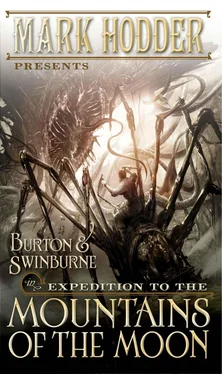Mark Hodder - Expedition to the Mountains of the Moon
Здесь есть возможность читать онлайн «Mark Hodder - Expedition to the Mountains of the Moon» весь текст электронной книги совершенно бесплатно (целиком полную версию без сокращений). В некоторых случаях можно слушать аудио, скачать через торрент в формате fb2 и присутствует краткое содержание. Жанр: sf_stimpank, на английском языке. Описание произведения, (предисловие) а так же отзывы посетителей доступны на портале библиотеки ЛибКат.
- Название:Expedition to the Mountains of the Moon
- Автор:
- Жанр:
- Год:неизвестен
- ISBN:нет данных
- Рейтинг книги:5 / 5. Голосов: 1
-
Избранное:Добавить в избранное
- Отзывы:
-
Ваша оценка:
- 100
- 1
- 2
- 3
- 4
- 5
Expedition to the Mountains of the Moon: краткое содержание, описание и аннотация
Предлагаем к чтению аннотацию, описание, краткое содержание или предисловие (зависит от того, что написал сам автор книги «Expedition to the Mountains of the Moon»). Если вы не нашли необходимую информацию о книге — напишите в комментариях, мы постараемся отыскать её.
Expedition to the Mountains of the Moon — читать онлайн бесплатно полную книгу (весь текст) целиком
Ниже представлен текст книги, разбитый по страницам. Система сохранения места последней прочитанной страницы, позволяет с удобством читать онлайн бесплатно книгу «Expedition to the Mountains of the Moon», без необходимости каждый раз заново искать на чём Вы остановились. Поставьте закладку, и сможете в любой момент перейти на страницу, на которой закончили чтение.
Интервал:
Закладка:
“Herbert,” Swinburne whispered. “I'll go and have a little chinwag with old tin-head.”
He staggered away, stopped when his trousers slipped to his ankles, hauled them up, fastened his belt, and continued on until he came to the philosopher's tent.
He pushed through the flap.
“I say, Herbert, I'm not in the slightest bit sleepy. Shall we-”
He stumbled to a halt. The clockwork philosopher was sitting at a makeshift table and was completely motionless. Wrapped in robes, he looked somewhat akin to a bundle of laundry.
“Herbert?”
There was no response.
Swinburne stepped over to his friend, put a hand on his shoulder, and gave him a shove.
Herbert didn't budge.
He'd wound down.
The poet sighed and turned to leave, but as he did so, a book on the table caught his eye. It was a large notepad, on the cover of which was written the legend: First Principles of Philosophy .
Curious to see how far along Herbert had got with his project, Swinburne reached for the book, slid it toward himself, and opened the first page. He read:
Only equivalence can lead to destruction or a final transcendence.
Only equivalence can lead to destruction or a final transcendence.
Only equivalence can lead to destruction or a final transcendence.
Only equivalence can lead to destruction or a final transcendence.
The poet frowned and flipped the pages to the middle of the book.
Only equivalence can lead to destruction or a final transcendence.
Only equivalence can lead to destruction or a final transcendence.
He kept turning until he came to the last page upon which anything was written.
Only equivalence can lead to destruction or a final transcendence.
Only equivalence can lead to destruction or a final transcendence.
Only equivalence can lead to destruction or a final transcendence.
“My Aunt Agatha's blue feather hat!” he exclaimed.
The next day, William Trounce complained of a thumping headache, Maneesh Krishnamurthy collapsed with malarial fever, and a messenger arrived in Ugogi. The latter had run all the way from Mzizima with a dispatch for Isabel from those Daughters of Al-Manat who'd remained behind at the fast-expanding Prussian settlement. His first words to her, in Kiswahili, and translated by Burton, were: “You will pay me very well, I should think, for I have run far and far and far!”
Burton assured him that he'd be generously rewarded.
The man closed his eyes and recounted the message in a singsong voice. He spoke in Arabic, though he obviously didn't understand the language and was merely recounting what he'd been told, parrot fashion. He said: “O Al-Manat, peace and mercy and blessings of Allah upon thee, and upon those who follow thy lead, and upon those who travel with thee. May he grant safety, speed, and good fortune to this messenger, who, regrettably, must deliver to thee bad tidings, for a great many Prussians continue to arrive in Mzizima and they are now too strong for us to fight without thy wise counsel. A force of perhaps a thousand has departed the camp and is travelling westward. We follow and are striking them at intervals, in the manner thou taught us, though we are far fewer in number. May Allah protect us and you and give us all strength to endure.”
Burton instructed Said to issue the man with a doti of richly patterned cloth, a box of sami-sami beads, and three coils of brass wire. The messenger, much pleased, joined the villagers to rest, drink beer, swap news, and boast of his newfound wealth.
“It sounds like an invasion force,” Isabel said to Burton. “What is Bismarck up to, sending so many troops to Africa?”
“Palmerston thinks he's trying to establish a German empire, and that he intends to use Africa's vast natural-and human-resources to fuel it.”
“So the Prussians are here to stake a claim?”
“It would appear so.”
“Then we must stop them.”
“I don't see how we can. Besides which, that's not what we're here for.”
“But surely this is a challenge to the British Empire, Richard? Is it not our duty to do something about it?”
“What do you suggest?”
“We fight!”
Burton held his hands out wide in a gesture of disbelief. “Look at us, Isabel! We're nothing but a ragtag expedition! Our clothes are half-rotted off us! We look positively skeletal! We're exhausted and ill!”
“Will Palmerston send troops?”
“I consider that highly probable.”
“Then once your mission is done, Richard, I shall lead my women against the Prussians until the British Army arrives.”
The king's agent blew out a breath and shook his head. “I can't stop you, of course. You're the most obstinate woman I've ever met. You infuriate me-and it's why I fell in love with you. Just don't take unnecessary risks, please.”
“We shall do what we do best: hit them and run. Then wait, and, when they least expect it, we'll hit them again, and then we'll run again.”
The expedition spent the remainder of the day resting, writing journal entries, checking equipment, and socialising with their generous hosts.
Before sun-up the following morning, much recovered, the travellers set forth across the Marenga M'khali, a stretch of desert that would take four days to traverse. The ground was hard and cracked, the scrub thorny, and the horizon lumpy with low, quivering, and blurring hills.
Close up, the terrain was a rusty-brown shade, strewn over with rocks and rubble and tufts of brittle white grass. As it receded into the distance, it grew paler, bleaching to a soft yellow that eventually blended hazily into the washed-out-blue sky, which deepened in colour overhead.
The sun was like fire upon their necks in the mornings, and blinded them in the afternoons.
Burton, Swinburne, and Trounce were mounted on mules. Sister Raghavendra and Miss Mayson were riding with the Daughters of Al-Manat. Krishnamurthy was being borne along on a litter.
Said bin Salim and his eight Askaris kept the liberated slaves moving despite their inclination to laze until sundown. Burton by now considered his ras kafilah a marvel of efficiency and industriousness. Between Said and Sister Raghavendra, the expedition had progressed with a minimum of annoyances and illnesses.
Herbert Spencer limped along at the back of the column of men.
Algernon Swinburne had said nothing to anyone about what he'd seen in the clockwork man's book. He didn't know why he kept it quiet-he simply felt no need to raise the subject. At one point, on the third day, when they were climbing onto higher ground and passing huge blocks of weathered granite, he had a sudden urge to speak to Herbert about the First Principles of Philosophy , but when he'd approached him, he heard Pox-on the philosopher's head-mutter, “Sweet cheeks,” and changed his mind. Herbert was the only individual the parakeet ever complimented, and for some reason, hearing the messenger bird was enough to make the poet change his mind. Swinburne dropped the subject. He knew it was wrong to do so; he knew it made no sense; but he dropped it anyway.
The expedition did not cross the desert alone. Antelope and buffalo, giraffe and rhinoceros, elephants and zebra, in herds and alone, they all plodded along wearily, making their way toward the nearest watering holes. Burton watched and envied them their uncomplicated instincts. He wished his own possessed such clarity, and wondered whether he'd made the right choice in accepting the king's commission.
Marry the bitch, Burton. Settle down. Become consul in Fernando Po, Brazil, Damascus, and wherever the fuck else they send you. Write your damned books!
Читать дальшеИнтервал:
Закладка:
Похожие книги на «Expedition to the Mountains of the Moon»
Представляем Вашему вниманию похожие книги на «Expedition to the Mountains of the Moon» списком для выбора. Мы отобрали схожую по названию и смыслу литературу в надежде предоставить читателям больше вариантов отыскать новые, интересные, ещё непрочитанные произведения.
Обсуждение, отзывы о книге «Expedition to the Mountains of the Moon» и просто собственные мнения читателей. Оставьте ваши комментарии, напишите, что Вы думаете о произведении, его смысле или главных героях. Укажите что конкретно понравилось, а что нет, и почему Вы так считаете.












